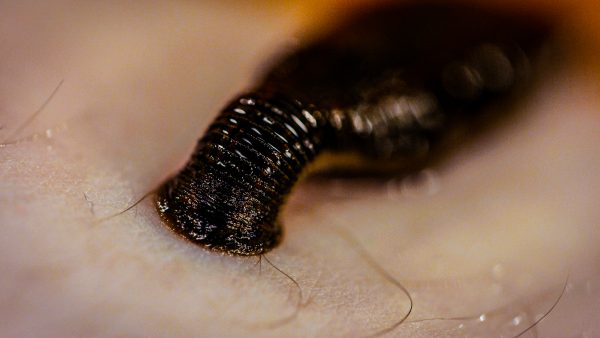Parasitism Definition
Parasitism benefits one organism at another's expense, causing harm. For example, ticks feed on hosts like humans without giving benefits.
View Lesson on Symbiosis (Interactions Between Organisms)
Become a member to get full access to our entire library of learning videos, reading material, quiz games, simple DIY activities & more.
Become a member to get full access to our entire library of learning videos, quiz games, & more.
Plans & Pricingto watch this full video.

Access All Videos
and Lessons, No Limits.
Access All Videos

No credit card required,
takes 7 sec to signup.
No card required

Ready-to-go lessons
that save you time.
Ready-to-go lessons
If you are on a school computer or network, ask your tech person to whitelist these URLs:
*.wistia.com, fast.wistia.com, fast.wistia.net, embedwistia-a.akamaihd.net
Sometimes a simple refresh solves this issue. If you need further help, contact us.
Symbiosis (Interactions Between Organisms)
Fun Facts
- Leeches suck blood from hosts like birds and reptiles.
- Green-banded broodsacs take over snail brains to attract birds.
- Mistletoe extracts water and nutrients from trees, sometimes killing them.
Why Do We Need To Know About Parasitism
Learning about how some living things live off others helps us understand how everything in nature is connected and why it’s important to keep these connections healthy. This is useful for doctors, vets, and scientists who study animals and plants, especially the ones that cause problems like ticks and leeches.
It’s also important for people who work with forests and farms to know about things like mistletoe that can harm plants. Plus, experts who work on keeping oceans and lands healthy need to understand these relationships to help protect all kinds of life. Knowing about these parasitic relationships helps lots of different jobs and keeps our environment healthy.
Frequently Asked Questions
Check out the Full Lesson on Symbiosis (Interactions Between Organisms)
In this lesson, we learn that:
- Symbiosis is the interaction between organisms in an ecosystem.
- These interactions can be helpful, harmful or have no effect.
- This video explores different types of symbiosis like predation, mutualism and parasitism.
Related Topics
- Absorbency Definition
- Amplitude Definition
- Binary Code Definition
- Carnivore Definition
- Conservation Biologist Definition
- Continental Drift Definition
- Definition Of Extreme Weather
- Definition Of Force
- Definition Of Nutrients
- Dichotomous Key Definition
- Digital Signal Definition
- Divergent Boundary Definition
- Electricity Definition
- Environment Definition
- Extinct Definition
- Fertilizer Definition
- Frequency Definition
- Gas Definition
- Generator Definition
- Information Transfer Definition
- Molecule Definition
- Moon Definition
- Motion Definition
- Mutualism Definition
- Natural Disaster Definition
- Newton’s 3rd Law Of Motion Definition
- Non-renewable Energy Definition
- Parasitism Definition
- Period Definition
- Phases Of The Moon Definition
- Pollen Definition
- Pollinator Definition
- Predation Definition
- Push Definition
- Rain Definition
- Recycle Definition
- Season Definition
- Seeing Definition
- Signal Definition
- Soil Erosion Definition
- Species Definition
- Symbiosis Definition
- Thermometer Definition
- Tsunami Definition
- Virus Definition
- Weather Front Definition
- Weather Map Definition
- Weight Definition
Start a Free Trial Today. Get a $5 Amazon Gift Card!
Teachers! Start a free trial & we'll send your gift card within 1 day. Only cards left. Try it now.
Select Grade
Select Subject
This email is associated with a Science Kit subscription. Kit subscriptions are managed on this separate page: Manage Subscription

-
Download InvoiceScience & Math$/yr
-
Download InvoiceScience Only$/yr

access all lessons
• No credit card required •
"My students loved the videos. I started the video subscription in May and used them as a review before the state test, which I know contributed to 100% of my class passing the state test."
Rhonda Fox 4th Grade Teacher, Ocala, Florida
• No credit card required •
"My students loved the videos. I started the video subscription in May and used them as a review before the state test, which I know contributed to 100% of my class passing the state test."
Rhonda Fox 4th Grade Teacher, Ocala, Florida
• No credit card required •
Already a member? Sign In
* no credit card required *

* no credit card required *
* no credit card required *


no credit card required
Skip, I will use a 3 day free trial
Enjoy your free 30 days trial
-
Unlimited access to our full library
of videos & lessons for grades K-5. -
You won’t be billed unless you keep your
account open past your 14-day free trial. -
You can cancel anytime in 1 click on the
manage account page or by emailing us.
-
Unlimited access to our full library of videos & lessons for grades K-5.
-
You won't be billed unless you keep your account open past 14 days.
-
You can cancel anytime in 1-click on the manage account page.
Cancel anytime in 1-click on the manage account page before the trial ends and you won't be charged.
Otherwise you will pay just $10 CAD/month for the service as long as your account is open.
Cancel anytime on the manage account page in 1-click and you won't be charged.
Otherwise you will pay $10 CAD/month for the service as long as your account is open.
We just sent you a confirmation email. Enjoy!
DoneWe use cookies to make your experience with this site better. By using this site you agree to our use of cookies. Click "Decline" to delete and block any non-essential cookies for this site on this specific property, device, and browser. Please read our privacy policy for more information on the cookies we use.Learn More
We use cookies to improve your experience. By using this site, you agree to our use of cookies. Click "Decline" to block non-essential cookies. See our privacy policy for details.Learn More



























































































































